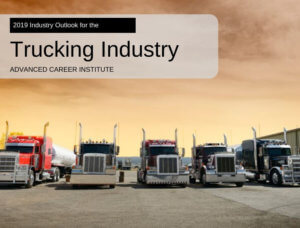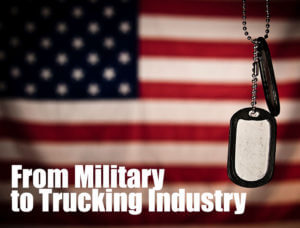Trucking
Helpful Information About Potential Trucking Jobs
-

Finding the Best Carrier for Your Lifestyle
Updated 4/18/25 When considering which trucking carrier you will work for, you have many options to consider. Trucking is a job that is currently in high demand with ~240,000 available throughout the U.S. as of 2025. This high demand for truckers means that you also have your choice of which type of trucking job you would like to do. Whether you prefer to be a local, regional, or over-the-road trucking, there is a position out there to meet your needs! Sometimes when you're looking for the right fit, you're going to be talking to recruiters.Speaking to the Recruiters:
During your training at Advanced Career Institute, you will have the opportunity to speak with several CDL recruiters. When talking to them, be sure that you are getting a feel for what that specific truck carrier has to offer. Each carrier will offer their perks and benefits. It will be all about finding one that fits your lifestyle and your personal needs. There is no one "right choice" for everyone. Asking the right questions up front and being honest about your needs and expectations in the industry will help you come out with a satisfactory experience once you choose with whom you want to work. That's why we want to give you the top 5 most important questions to ask any cdl recruiter, and why it matters to you!1. What do you pay your drivers for each type of job?
Obviously the first, and most important thing to any new driver is how much they would earn with a given company. By asking a recruiter this question, you'll get a clear understanding of the companies pay scale for their drivers - whether your a local driver or over the road.2. What is your company's home-time policy?
Many truck drivers have families, and it's important to know how often they will be home with them! \ Asking a CDL recruiter this question will give you the chance to learn about what their company offers to help you know what your work-life balance would be. This will ultimately give you an understanding of what your personal life would look like if you were to work for their company.3. What kinds of benefits does your carrier offer to its drivers?
It's important to know what kind of insurance, retirement and other coverage you're given as an employee of any carrier. Recruiters will be able to tell you about the basic information that you'll need to know. Do you have health, vision, and dental? Would you have disability coverage, should you need it? These are important things to consider when choosing the right company for you!4. What type of on-the-job training will I receive as a new driver?
Here at Advanced Career Institute, we will teach you the rules and how to operate the truck to get you on the road to success! It's important to ask - is there more training when you join a carrier? It's important to know what to expect when starting a job. This includes how you'll learn their rules and regulations to do your job well! CDL recruiters will give you insight on what to expect.5. Do you provide driver bonus opportunities?
Everyone wants to join a carrier that has incentives for good work! It's important to know, first of all, what kind of incentives and bonuses you're wanting from a company! Asking the carrier recruiters what they offer to their drivers is important. How else will you know if it's the right fit for you? There are many more questions that you can ask a recruiter before joining a carrier, and each person's list of questions is different! However, these questions are important for someone entering the world of CDL! If you want to check out more of our partners that visit us, check out our social media! For further information about questions you will want to ask a recruiter before signing on! If you have questions about training be sure to contact us at the Advanced Career Institute for further assistance. -

Helpful CDL Study Habits
Congratulations! You made it through trucking school and are now on the final leg of your journey towards a rewarding career. Do not run out of steam just yet! The written portion of your CDL exam is crucial. Let's take a look at 5 must-know tips to pass your written CDL exam the first time.Practice Makes Perfect
The best way to physically and mentally prepare for the written exam is to take practice exams. This will give you a feel for the real deal. Start out by taking the practice exams as "open book" tests. Work your way up to giving yourself a time limit. Finally, before the big day, take a practice exam as if it is the real thing without notes or help of any kind. This will help you to gauge how well you actually know the material.Understand Instead of Memorize
Memorizing is an extremely useful tool, and will certainly help you to a certain extent on the written exam. However, the key to being fully prepared is to understand the material and not just memorize it. The reason for this is if you truly understand the material. No matter how the question is asked on the exam, you will arrive at the correct answer. If you only memorize the material, an alternate wording on the exam can very well throw you and lead to an incorrect answer.Real World Applications
For concepts, you are having difficulty with, come up with real-world scenarios. By doing so, instead of just being words on a page or random facts, you can create an association between the information and how it applies to the real world. Real world applications make the information more relevant to your life.Utilize Study Strategies
Do not be afraid to utilize study strategies for the material you struggle with. Common examples of study strategies include flashcards, songs, rhymes, a phrase, or just about anything else that you can create an association with that will help you remember and understand the material come test time.Be Fresh and Alert
Last but not least, the night before the exam is not the night to stay up late watching a movie or hanging with your buddies. Go to bed at a decent hour and get a good night's sleep. Eat a filling breakfast on the morning of the exam. A good night's sleep and a good breakfast will ensure you are fresh and alert to take your exam. There is no substitute for hard work and putting in the time to make your dreams come true. Following these 5 tips will ensure you are well prepared for your written CDL exam and on your way to a fulfilling career. Contact us today for more information on our CDL training program!*This blog was originally written in 2015 and has been updated according to industry standards.
-

Checking Truck Driving Industry Outlook
As we close in on the year 2019, we are looking ahead to see what the new year holds for the trucking industry. Overall, the trucking industry can expect the coming year to be very positive. Consumer demand is slated to grow modestly and there are plenty of job vacancies for people who want to go to school to get their CDL and get into driving careers. The positive outlook on the industry is believed to extend even beyond 2019 according to many experts.Consumer Demand Continues to Climb
As we head into 2019, the overall consumer demand in the US is predicted to climb another 3-4% as the economy continues to recover from the 2008 financial crisis. Considering that about 70% of all consumer goods that travel throughout the US do so by truck, that means that there will be plenty of work for truck drivers. This promotes job security for those already in the industry and opportunities for those looking to join the industry.There Are Trucking Jobs to Fill
The trucking industry has ~52,000 job vacancies throughout the US with more scheduled to become available throughout 2019. The vast amount of open jobs in the industry means that there are job opportunities for everyone no matter where you may live. Job security once you earn your CDL is strong. The trucking industry is growing at a rapid rate and needing more drivers than ever just to meet consumer demand.Automatic Trucks Will Not Be Taking Jobs Away From Drivers Any Time Soon
Automatic trucks are not going to be a threat to truck driver's job security any time in the near future. While these trucks are being developed, they are only in their "infancy" stages of development. The first models are very unlikely to be able to drive themselves completely. Drivers will still have to do the more challenging maneuvers such as backing in and out of tight spaces or entering and exiting busy highways or interstates manually. It is likely to be a couple of generations or more of truck drivers that come and go before automatic trucks are even a remote possibility of being a reality. This means that drivers jobs are safe.Truck Drivers are Bringing Home the Bacon
Truck drivers are in high demand and they generally have a fairly high standard of living. Most truck drivers will begin as OTR drivers that make an average of $45,000+ per year. This is comparable or higher than many other jobs that require a college education. In addition to a modest starting salary, most companies offer drivers a few weeks of paid vacation each year, complete health benefits, and retirement benefits as well. Many large truck carriers are also willing to help a driver pay back their student debt or loans. Some offer $100 to $400 per month, above and beyond their regular wages and compensation, to pay back debts.Beginning a New Career
As the industry has many job vacancies and a steadily increasing consumer demand, now is a great time to get your CDL license. The New Year is a great time to get started in a great new career. For more information on starting classes and getting your CDL contact Advanced Career Institute for further assistance. -

Getting Ready for the Winter Weather
As the temperatures plummet and winter sets in, many truck drivers are beginning to consider how they will prepare their truck so they can continue on working through the winter months. It's important that truck drivers are aware of how they can prepare their truck for winter to ensure they are able to handle anything the cold, frigid temperatures and ice, sleet, and snow throw at them. The following are 6 great tips to help keep truck drivers safe on the road and to help them travel safely even through the winter season's most treacherous stretches:Keep Necessities on Hand
Should you break down on the side of the road, you should consider packing an emergency kit to help you through until someone can help you. A kit should include warm clothing and several blankets (in case you have to wait a while). Consider a supply of a couple gallons of fresh drinking water as well as portable snacks such as dried fruit, cereal bars, etc. to help keep you fed until someone can come to assist you.Prepare An Emergency Supply Kit for Your Truck
Beyond clothes and food, other basic emergency supplies will help in the case you should break down while driving. Consider keeping extra jumper cables, flares (to help cars see you), extra flashlights, etc. in case you happen to need these items if you were to break down while on the road.Give Your Truck an Extra Inspection
Checking over all the minor maintenance items that tend to go wrong with your truck before the winter starts can queue you if anything looks like it might be needing attention before the coldest weather arrives. Checking things like your batteries and filters and seeing if your tires need to be rotated or if your oil needs changed can help ensure that your vehicle is primed for winter. These basic steps can help you avoid a breakdown or lessen your chances of a breakdown out in the frigid cold if these things are up-to-date and in working order. Nothing is a guarantee but it's safer than not checking at all.Check Your Antifreeze
Ensuring that you have the appropriate amount and mixture of antifreeze in your vehicle is vital when it comes to clearing windshields and windows in inclement weather. Be sure to check your antifreeze levels regularly as you use the fluid throughout the winter. Driving with ice or other precipitation particles on your windshield is not only dangerous to you but others as well. If you need to defrost till you can see move over to the side of the road and wait before driving with an obstructed view.Have Your Breaks & Tire Traction Checked
Your breaks will need to be in their best shape in order to help you stop on snow-covered or icy roads. You will also need to ensure your tire traction is up to snuff in order to allow your vehicle to grip the road and keep you in your land during treacherous conditions.Consider Snow Chains
Consider packing snow chains in your truck if your vehicle and the types of tires you have done well with them. Many companies will have policies on using snow chains and on when to use or not use them. Understand that appropriate conditions in which to use your snow chains for safety and which situations might be made more dangerous by snow chains rather than made safer. These are a few great things to keep in mind when you are driving during the winter months. While you can't prepare for everything, ensuring you check over your truck each time you drive, you will ensure that you catch preventable breakdowns. In the case that rare breakdowns do happen in the cold weather, if you have emergency supplies on hand you will be prepared to wait it out until someone can come to your aid. For more information on keeping your truck safe and running smoothly as possible during the winter months, please feel free to contact us. -

Navigating Through Your New Career
So you’re ready to be a truck driver, huh? Of course, you are. If you’re in truck driving school, chances are you’re chomping at the bit to get out of the practice truck and get into a truck that will help you earn a living. Barr-Nunn Transportation driver, Dave Casanova has been climbing into the cab of a truck for 18 years. He has experience on both the general freight and expedited side of the trucking business. In other words, he has some tips for new truck drivers. Casanova offered his tips that every new truck driver needs to know. Whether it’s managing the job, the expectations surrounding the job, and how to build experiences that counts in the industry, he has some great advice!1. Trucking is more mental than physical.
Managing your own mental state is the secret to trucking success. “It can be a very frustrating and depressing job if you don’t carry the right mindset,” he said. “For some people, being away from the family weeks at a time can quickly become unmanageable.”2. Don’t expect the world right out of the gate.
It’s not realistic to expect your dream job right out of trucking school. “The first job you get out of school most likely won't be the one you stay at for 20 years,” Casanova said. “This first job is where you should be learning about everything you need to be safe and compliant. This first job is where you start building a reputation for yourself as a safe, compliant driver.” Find a “Mr. Right Now” job for your first gig, then look for “Mr. Right” after you’ve gained a little experience.3. It takes about a year to “get it.”
Things may feel a little chaotic during the first year. “To get a good handle on all the rules and regulations in trucking, it will take about a year,” he said. “The 3 biggest points to focus on are following distance, knowing the Smith System of driving, and trip planning. Remember that 80,000-lb. rigs don't stop quickly and can't be turned around as readily as a car when you miss a turn.”4. Year one goal: no accidents.
In the midst of that first year, focus on safety. Simply finishing the year accident-free can in itself be a victory. Casanova suggests living the time-tested safety rule: “G.O.A.L. Get Out And Look,” he said. “Anytime you need to back up, you absolutely need to get out of the rig and check out your surroundings to avoid backing accidents.”5. Know your career goals.
Know what you have, what you need, and what you want from your career, and have specific set goals. “Decide what you want out of this career,” he said. “Are you looking for maximum income? Is home time a top priority? What benefits or health insurance do you need to make you happy? Once you've got an idea of what you need to be happy, you can research companies efficiently.”6. Don’t job hop.
Many young people switch jobs frequently in their first year, looking for the next possible big opportunity. As much as it’s not the greatest strategy outside of the trucking industry, it most definitely not in trucking. Your time of service matters greatly. “The fewer number of times you change jobs, the more likely you will wind up at a top paying carrier,” he said. “Doing your homework prior to jumping ship is crucial if your goal is working for a top tier carrier at some point.”7. It’s all about attitude.
Remember that even with a driver shortage, your job is not always guaranteed. A carrier/driver relationship should be built on mutual benefit. “I don't believe there is a shortage of drivers. I believe there is a shortage of good drivers. Casanova said. “You want to continue to grow your reputation. By bringing a good attitude, when things get slow, you increase your chances of being a driver that gets taken care of. Be a good driver and reap the rewards.”BONUS! -- Find a mentor. Or, better yet, mentors.
Find a few industry veterans to get advice from on the road. You want good solid resources that will help keep you from making common rookie mistakes. “Experienced drivers can be a wealth of knowledge. By finding a few that you trust to tell it to you straight, you stand to gain a lot. As you earn experience you can bounce ‘what ifs’ off of them, to see how they would handle different situations. Keep in mind though, not every experienced driver can be a mentor. You really need to be selective of whom you take advice from.” If you're ready to get started on your new career, let Advanced Career Institute help you begin your CDL training. Advanced Career Institute provides Class A CDL training at four locations throughout California and one location in Nevada. Contact us today to begin! -

Why Veterans Should Consider Truck Driving
Veterans who are looking for a career after their time in the military have several different options to consider as they return to civilian life. One of those that they should consider carefully is the trucking industry. From military life to the trucking industry, there seems to be a seamless transition. There is a reason several veterans have chosen the trucking life and here's why.You Might Not Have To Take the Road Test:
Veterans who worked in the service and have at least two (2) years of experience managing heavy military equipment and machinery, may not have to take their road test. This military exemption is also known as the "Military CDL Skills Test Waiver." If the veteran has operated such heavy machinery in the last year, they will be exempt from having to take the road part of the CDL test. This waiver is in place in all 50 states and the District of Columbia. This makes it one less "hurdle" that a veteran must clear to get on the road and can speed up the amount of time that it takes to start their new career.Truck Drivers & Military Personnel Share Similarities:
Both military and professional truckers alike are relied upon to execute their jobs in a relatively independent manner once they are told what the expectations are. Both professions are expected to be punctual, reliable, and disciplined to get the job done at "whatever cost it takes". Many jobs in both professions are also done on a schedule and that schedule must be stuck to, making time management the key to the success. Considering the similarities between both jobs, the trucking industry is often a much easier transition for many veterans than a variety of other jobs would be, making the transition back to civilian life much smoother.Financial Assistance is Available for Education:
Many veterans are eligible to receive financial assistance through the Advanced Career Institute. As an Active Duty or Military Veteran, you may be eligible for educational benefits through numerous GI Bill® programs. Funding programs are offered through the Veterans Administration for active service members, reservists, veterans, dependents, and spouses. At ACI, we provide veterans assistance through several bill and assistance programs. Check out our Veterans Assistance page for more information.Great Salaries & Full Benefits + Job Security:
Many truck carriers are paying the upwards of $40,000+ for truck drivers beginning in their first year. Companies are offering full benefits including complete healthcare coverage, retirement benefits (many with an employee match), and vacation time. You will have job security as a truck driver is virtually guaranteed. There is a shortage of truck drivers and as consumer demand continues to increase, the number of drivers needed is projected to rise. This means that your job will not be going anywhere in the near in the foreseeable future. If you are a veteran who is looking to obtain their CDL license and get into the truck driving industry, please feel free to contact us. All of us at Advanced Career Institute would feel honored to help you transition from military life to the trucking world. Let's get you started today! ‘‘GI Bill® is a registered trademark of the U.S. Department of Veterans Affairs (VA). More information about education benefits offered by VA is available at the official U.S. government Web site at https://www.benefits.va.gov/gibill."

